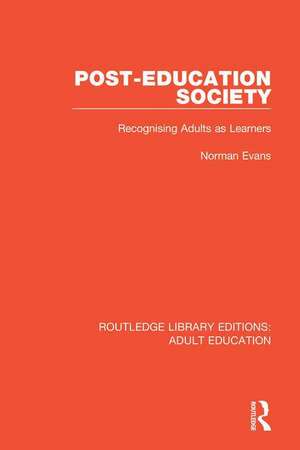Post-Education Society: Recognising Adults as Learners: Routledge Library Editions: Adult Education
Autor Norman Evansen Limba Engleză Paperback – 18 aug 2020
| Toate formatele și edițiile | Preț | Express |
|---|---|---|
| Paperback (1) | 309.69 lei 43-57 zile | |
| Taylor & Francis – 18 aug 2020 | 309.69 lei 43-57 zile | |
| Hardback (1) | 552.60 lei 43-57 zile | |
| Taylor & Francis – 23 noi 2018 | 552.60 lei 43-57 zile |
Din seria Routledge Library Editions: Adult Education
-
 Preț: 245.34 lei
Preț: 245.34 lei -
 Preț: 245.87 lei
Preț: 245.87 lei -
 Preț: 311.60 lei
Preț: 311.60 lei -
 Preț: 211.47 lei
Preț: 211.47 lei -
 Preț: 309.69 lei
Preț: 309.69 lei -
 Preț: 305.67 lei
Preț: 305.67 lei - 34%
 Preț: 625.03 lei
Preț: 625.03 lei -
 Preț: 211.47 lei
Preț: 211.47 lei -
 Preț: 205.76 lei
Preț: 205.76 lei -
 Preț: 302.40 lei
Preț: 302.40 lei - 54%
 Preț: 416.35 lei
Preț: 416.35 lei -
 Preț: 309.69 lei
Preț: 309.69 lei -
 Preț: 309.69 lei
Preț: 309.69 lei - 36%
 Preț: 9198.24 lei
Preț: 9198.24 lei -
 Preț: 309.69 lei
Preț: 309.69 lei -
 Preț: 284.52 lei
Preț: 284.52 lei -
 Preț: 293.02 lei
Preț: 293.02 lei -
 Preț: 211.47 lei
Preț: 211.47 lei -
 Preț: 211.47 lei
Preț: 211.47 lei -
 Preț: 208.20 lei
Preț: 208.20 lei - 34%
 Preț: 625.03 lei
Preț: 625.03 lei -
 Preț: 309.69 lei
Preț: 309.69 lei -
 Preț: 322.97 lei
Preț: 322.97 lei -
 Preț: 322.97 lei
Preț: 322.97 lei -
 Preț: 211.47 lei
Preț: 211.47 lei - 34%
 Preț: 552.60 lei
Preț: 552.60 lei -
 Preț: 309.69 lei
Preț: 309.69 lei
Preț: 309.69 lei
Nou
Puncte Express: 465
Preț estimativ în valută:
59.26€ • 62.03$ • 49.32£
59.26€ • 62.03$ • 49.32£
Carte tipărită la comandă
Livrare economică 31 martie-14 aprilie
Preluare comenzi: 021 569.72.76
Specificații
ISBN-13: 9781138334014
ISBN-10: 1138334014
Pagini: 160
Dimensiuni: 156 x 234 x 9 mm
Greutate: 0.45 kg
Ediția:1
Editura: Taylor & Francis
Colecția Routledge
Seria Routledge Library Editions: Adult Education
Locul publicării:Oxford, United Kingdom
ISBN-10: 1138334014
Pagini: 160
Dimensiuni: 156 x 234 x 9 mm
Greutate: 0.45 kg
Ediția:1
Editura: Taylor & Francis
Colecția Routledge
Seria Routledge Library Editions: Adult Education
Locul publicării:Oxford, United Kingdom
Public țintă
Postgraduate, Professional, and UndergraduateCuprins
1. Post-industrial Society 2. Adult Growth and Development 3. An Adult Society 4. A Post-Education Society - Recognising and Using Adults' Learning
Descriere
Originally published in 1985, this book argues that to make sense any attempt to improve the situation must take account of what we now know about adult growth and development, accepting as an operational imperative that it is as problematic and turbulent as childhood.
